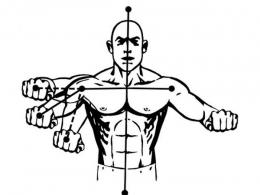How to eat to gain muscle mass
Don't know what to eat for breakfast? Dinner? Dinner? Or all of the above? Now you will definitely master such knowledge. In one of the previous articles entitled "" we examined the most important aspects and components of proper nutrition for gaining muscle mass, without which, unfortunately, it is simply impossible to succeed in the metamorphoses of your body.
Today we will answer the question of how to eat right to gain muscle mass and discuss nutrition strategies. The menu is universal and, by adjusting portions and replacing some of the components (for example, porridge not with water, but with milk and vice versa), it will suit almost any athlete.
So, what is the perfect "recipe" for muscle building nutrition? The answer is frighteningly simple, at least in general terms:
- firstly, need to eat the right amount of food at certain times of the day
- Secondly, eat the right kinds of food
Doing one or the other is NOT ENOUGH! An example would be the ectomorph, who is insanely pedantic when it comes to choosing foods to gain muscle mass, but does not eat enough in one sitting. Or the athlete who goes beyond all limits in his mass-gathering quest, devouring absolutely everything in his path until the stomach becomes his largest part of the body.
In contrast to the examples above, there should be an ideal muscle-building diet that will allow you to grow, gain muscle and mass without becoming an “ugly ogre”. Such a plan requires a more methodical approach. This is what we will consider in the next 9 rules. And it doesn’t matter if it’s a girl or a man who reads it - this applies to anyone, the only difference is in the portions of the dishes. Try them for yourself, noting the effect of each of them. As a result, you will be able to create your own ideal diet and, in combination with a good one, you will definitely succeed with your goals.
Eat more often to gain muscle mass
You will not be able to maximize your growth and gain muscle mass if your meals are divided into three or four meals a day. Instead, you need to stick to 6 and even 7 meals a day. The benefits are unimaginably multifaceted: smaller amounts are absorbed much more easily, which means you will get much more amino acids, vitamins and minerals than if you were eating large amounts, but only a few times a day.
More frequent use will help increase testosterone and insulin levels, which promote growth, while reducing levels of cortisol, a growth-inhibiting hormone that is produced during exercise. Keep this in mind when compiling a nutrition menu for gaining muscle mass.
Keep Your Proteins Right
Protein consists of amino acids - the main components of muscle tissue and the most important thing in nutrition for gaining muscle mass for an ectomorph. You need a lot of amino acids for your body to build muscle. You need to consume AT LEAST 2 grams of protein per kilogram of body weight daily. If your weight is 90 kg, you need to include at least 180 grams of protein in your daily plan.
it 26-30 gr in one sitting, which is equivalent to about 150 grams of chicken breast or 170 grams of cottage cheese. This is simple mathematics, but many people neglect it, and their goals become unattainable.
Manipulate protein intake at key points
Follow the rule "2 grams of protein per kg of body weight" within three or four weeks. If you don't see significant results over time, adjust your protein intake at two critical times: post-workout and before bed. After workouts, increase your intake to 40-60g, preferably with a fast-acting whey protein. Before bedtime, 30-40 grams of casein protein will help keep you in an anabolic state while you sleep.. Otherwise, it will be too long and destructive fasting for the body, and your nutrition for muscle gain and mass training program will be ineffective.
Increase Carbohydrates
Carbohydrates work together with protein to create hormonally favorable conditions for growth. They help the process of transporting amino acids from food to the muscles, which will be made into new muscle tissue or used to repair damaged tissue during exercise. Well, the fact that carbohydrates are a powerful source of energy, I think everyone already knows. Start with 4 gr char. per kilogram of body weight per day. But, unlike protein, divide them between the first five or six meals, removing carbohydrates from the last one or two meals.
Thus, a 90 kg athlete should eat 60-72 grams of carb. in each of their first five or six sittings, with minimal ang. after.

Manage carbs at key moments
Follow the rule "4 g char. per kg of weight" within three or four weeks. If you don't see results, increase your carb intake at two critical times: the first meal of the day and post-workout. Adding even more carbs to your breakfast, combined with protein, helps stop the breakdown that occurs during the last two to three hours of a night's sleep and boost your metabolism (contrary to common misconceptions, increased metabolism actually increases muscle growth):
- No. of ang. for breakfast and after training should be increased by 50%. For example, if you ate 60 grams for breakfast, increase to 90 grams.
- By the fifth week of following the muscle mass diet, if you have not yet seen improvement, increase the amount of carbohydrates in your diet to a total of 5 grams per kg of body weight per day.
Don't Avoid Fat
A common mistake among those who are trying to build muscle is the inability to distinguish between good and bad fats. The truth is that not all fats are the same. Healthy monounsaturated omega 3 and 6 fats can be a huge support for athletes trying to eat right to gain muscle. Emphasize the following foods that are great for building muscle: avocados, salmon and other oily fish, nuts, healthy oils like canola and olive.
Say yes to vegetables
Eating a ton of vegetables will not help you get a huge body, but it will be an indispensable aid in the processing of other foods you consume. With the digestive system of hardgainers, during mass-gaining diets, there are often problems with calories in excess of the norm. It is the dietary fiber in our diet that is designed to help with digestive processes - they provide us with useful trace elements and vitamins.






